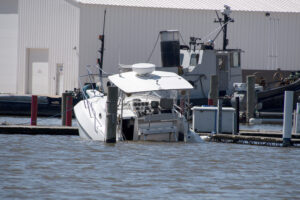If you have a boat or are considering buying one, you should understand your insurance obligations and what is permitted under your coverage.
Owning a boat opens you up to a whole new set of liabilities, particularly property damage to a third party or physical injury to someone else.
Policies also include a number of exclusions that you need to be aware of so that you are not caught in a situation where you may not be covered.
In this article, we look at a number of insurance, risk, and liability issues that can arise when you own a boat.
Most personal boat policies include geographical limitations on where you can take your vessel.
If you stray out of this area, the insurance company may deny your claim if you have an accident outside your permitted zone of operation.
You should study your policy to make sure that it covers the areas that you will be boating in and, if the policy is too restrictive, you can work with us to negotiate with your insurer to expand your navigational limitations.
Alcohol
Like drunken driving, drunken boating is a criminal offense. For many people boating and having a few drinks go together, but your judgment is impaired when navigating a boat just as it is when you are driving a car.
All states have laws on drunken boating, and for good reason: There were over 4,000 boating accidents that contributed to more than 600 deaths in 2015, according to the U.S. Coast Guard. Alcohol use is the top cause of boating accidents.
Uninsured-boater coverage
Unlike vehicle insurance laws, many states do not require liability insurance for boats and if an uninsured boater smacks into your vessel, you’ll want to make sure that you and your occupants are covered.
Uninsured-boater coverage protects owners from potential liabilities for bodily injury to their passengers. If there is damage to your boat, it will be covered by the property portion of your policy.
Understand policy exclusions
When shopping with us for a boat policy, you should be clear about how you will use the boat and all of the specifics of your vessel. For example, if you plan to use it to pull wakeboarders or waterskiers, you need to tell us. In some cases, these activities may not be covered under your policy.
Also, if you are involved in more than leisurely activities, like competition in the above activities or scuba diving, any injuries or damage sustained may not be covered.
And if you want to help another boater in distress, your policy will likely not cover any damage you sustain or cause when towing another boat.
You can often get these exclusions removed, but it will cost you more in terms of premium.
Make safety the top priority
Whatever you do, you should make safety your top priority. If you are new to boating, you should seriously consider taking a course on how to safely navigate your vessel – and especially understand the rules in terms of maximum speeds in certain areas.
You should also learn how to dock properly and how to navigate your boat back into a slip. That’s where the majority of accidents occur while on the water.











